External links
.
| Abbreviation | ITC |
|---|---|
| Formation | 1999 |
| Type | Charitable organization Public Policy Think Tank |
Chairman Director | Terry Hill Dr Matthew Niblett |
| Website | www.theitc.org.uk |
The Independent Transport Commission, abbreviated to ITC, is a research charity and think tank based in the United Kingdom, devoted to exploring issues in the fields of transport, planning and land use. It is politically neutral, and has established a reputation as a nationally respected independent voice on transport and planning policy. [1]
It played a key role shaping policy in the 2000s (decade) with the publication of a series of authoritative and groundbreaking reports on road pricing, suburban planning, long-distance travel, and the future of transport. [2]
The ITC increased its influence to policymakers since 2010 with a series of reports [3] on UK aviation, freight and logistics, paying for roads, and the spatial effects of High-Speed Rail.
The commission delivers its work by publishing reports and policy papers, hosting special lectures and discussion evenings, and meeting with senior officials. The current director is Dr Matthew Niblett, and the chairman of trustees is Terry Hill CBE, also chairman of the Ove Arup Foundation.
Following the publication in 1998 of the Labour government's transport white paper entitled 'A New Deal for Transport: Better for everyone', a suggestion was made to Bernard Jenkin MP, the then Conservative Shadow Transport Secretary, that he would benefit from the services of a 'think tank'.
In the event, putting together a think tank to serve the Shadow Secretary of State proved impractical. Many of those approached liked the idea but did not want to serve a political party. This impasse was resolved when, thanks to Professor Mike McDonald, the infant ITC was offered a home by Professor Sir Howard Newby, vice-chancellor of the University of Southampton. The 'Independent Transport Commission', as it was then christened, was formally launched at the Royal Society of Arts in October 1999 with a commitment to be politically independent and to focus on evidence-based research.
In 2000 the commission invited Sir Patrick Brown, former permanent secretary to the Department for Transport, to be its chairman. Sir Patrick led the commission through several major projects, encouraging greater boldness in Labour's transport policy, and leading debate on a number of issues. He was succeeded by Dr David Quarmby CBE, who steered the commission through the development of a new Long Distance Travel forecasting model, the first of its kind. [4] In 2009 Quarmby left to lead the RAC Foundation and was succeeded by Simon Linnett, executive vice chairman of Rothschild.
The election of the Conservative led coalition in 2010 led to fresh opportunities after the spending cuts saw the demise of the government's own transport quango, the Commission for Integrated Transport, leaving the ITC as the main think tank in the field. [5] The ITC's own work on Transport Appraisal and Spending was later submitted to the Transport Select Committee for discussion. With the increased prominence and research output of the ITC Dr Matthew Niblett was appointed as its first director. In 2016 Simon Linnett retired as chairman and was succeeded by Terry Hill CBE.
Terry Hill (chairman), chairman, Ove Arup Foundation; Bridget Rosewell, commissioner, National Infrastructure Commission; Deborah Saunt, director, DSDHA; Kristine Beuret, director, Social Research Associates; Mary Bonar, partner, First Class Partnerships; John Dawson, chairman, International Road Assessment Programme; Nicholas Finney, consultant, UK Port Advisors; Dr Peter Headicar, reader in transport planning, Oxford Brookes University; Dr Stephen Hickey, chairman, Community Transport Association; Professor Peter Jones, Centre for Transport Studies, University College London; Sarah Kendall, independent consultant; Roger Madelin, head of Canada Water Development, British Land; Steven Norris, chairman, National Infrastructure Planning Association; John Worthington, co-founder, DEGW, and director of The Academy of Urbanism
The Independent Transport Commission hosts a regular series of Discussion Evenings [6] at the Alan Baxter Gallery in Farringdon. The commission uses these to develop new policy thinking, and guest speakers at previous events have included Sir David King, Professor Stephen Glaister, Professor Tony Travers and Andrew Haines. Topics explored include: the sharing economy, technology in travel, devolution, education and skills, health and transport, and children and travel.
In 2013 the ITC held the first in a new series of Annual Lectures, [7] exploring the future of transport and travel. These lectures are now a staple in the ITC calendar, and have previously explored the themes of fusion and its feasibility for the future of transport (2013); the fundamental motivations that drive human movement (2014); cities and our transport infrastructure (2015); and how technological advancements will change the way we travel (2016).
Road and Rail Travel Trends – This study has been exploring the factors that have been underpinning shifting trends in our travel patterns. The research has involved an attitudinal study as well as mining data from the commercial sector for details of behavioural change, alongside the publication of a number of key reports (see reports list below). This project has been working closely with the Department for Transport, advising them on updating their forecasting models.
Spatial Effects of High-Speed Rail – The ITC's study on the Spatial Effects of High Speed Rail in Britain has had a major impact on the national debate, contributing to a more thorough understanding of the wider benefits that will be afforded by the delivery of HS2. Since the project's inception in Autumn 2012, the ITC has worked closely with city-regions and government departments to move the discussion on HS2 from an engineering/railway project to that of a regeneration project. This was achieved through an ambitious programme of workshops, expert panels, symposia, European and UK study visits, and the publication of a series of detailed reports at high-profile launch events. [8]
Aviation Strategy – The ITC's research on aviation strategy has been complementing that of the Airports Commission by investigating the UK's long-term aviation needs, and the economic and behavioural implications of following different options. The work has been featured heavily in national news outlets such as the BBC and the Financial Times.
Freight and Logistics – This ITC work stream is exploring a number of important challenges, including whether improved intermodal freight operations can provide economic, environmental, and logistical benefits for the UK, as well as how to solve capacity problems and developing more efficient usage of freight networks. Stemming from issues about the collection and use of freight data and statistics raised in its inaugural project report, the ITC has been exploring this issue closely with policy makers and statisticians at the Department for Transport with a view to helping improve the quality of freight data, thereby measuring more accurately the importance of the sector to the UK economy as well as opportunities for efficiency improvements.
Tomorrow's Transport – In response to the Labour Government's Transport 10 Year Plan the ITC released in 2001 a report on 'Tomorrow's Transport' calling for bolder policy initiatives to tackle potential future problems. The report was widely reviewed, particularly the conclusion that traffic would eventually become increasingly unmanageable in suburban and rural areas, and helped shift policy in the direction of 'liveable streets'. [9]
Road Pricing – The commission published a series of reports on Road Pricing in the mid-2000s (decade) led by Professor Stephen Glaister. The reports were welcomed by the government as evidence that road pricing could pay for new roads. [10] At the same time the ITC noted that the government would have to be clear where the extra money would be spent, and warned that there was a risk of increasing congestion on rural roads. [11]
Long Distance Travel – In 2010 the ITC published the results of a three-year project developing a model to forecast long-distance travel demand in Britain. The study indicated that economic growth remained the single biggest factor affecting long-distance travel demand in Britain, and noted that in the absence of major policy measures the demand for air travel would accelerate. [12] The findings have recently been seized by the opposition to High Speed 2 to show that passenger growth arising from High Speed Rail could be limited. [13]
Suburbs – The commission asked Professor Marcial Echenique of the University of Cambridge to report on the future of British Suburbs and Exurbs. Echenique's report warned that current policies would encourage suburban expansion, increasing both commuting times and carbon emissions, forcing a rethink of government policy. [14]
Land Use Effects of the 10 Year Plan – Fearing that transport and land use policy had become increasingly disconnected, in 2002 the ITC commissioned Sir Peter Hall to investigate the land use effects of the Government's 10 Year Plan. Hall's conclusions that the Plan would encourage urban sprawl and threaten regeneration was credited with encouraging a re-orientation of policy towards more brownfield development. [15]
.

Transport in the United Kingdom is facilitated by road, rail, air and water networks. Some aspects of transport are a devolved matter, with each of the countries of the United Kingdom having separate systems under separate governments.
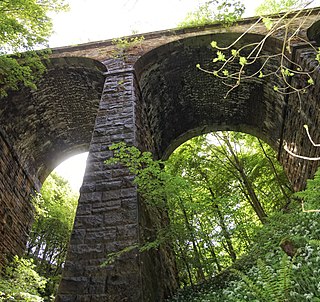
The Beeching cuts, also colloquially referred to as the Beeching Axe, were a major series of route closures and service changes made as part of the restructuring of the nationalised railway system in Great Britain in the 1960s. They are named for Dr. Richard Beeching, then-chair of the British Railways Board and the author of two reports – The Reshaping of British Railways (1963) and The Development of the Major Railway Trunk Routes (1965) – that outlined the necessity of improving the efficiency of the railways and the plan for achieving this through restructuring.
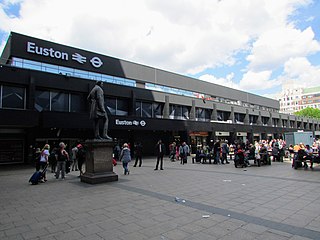
Euston railway station is a major central London railway terminus managed by Network Rail in the London Borough of Camden. It is the southern terminus of the West Coast Main Line, the UK's busiest inter-city railway. Euston is the tenth-busiest station in Britain and the country's busiest inter-city passenger terminal, being the gateway from London to the West Midlands, North West England, North Wales and Scotland.
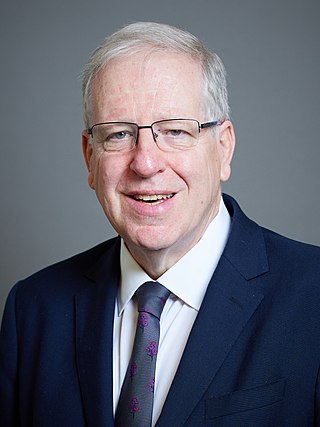
Patrick Allen McLoughlin, Baron McLoughlin, is a British politician. A member of the Conservative Party, he first became the Member of Parliament (MP) for West Derbyshire following the 1986 by-election. The constituency became the Derbyshire Dales for the 2010 general election; McLoughlin remained the seat's MP until 2019.

The Strategic Rail Authority (SRA) was a non-departmental public body in the United Kingdom set up under the Transport Act 2000 to provide strategic direction for the railway industry. Its motto was 'Britain's railway, properly delivered'. It was abolished by the Railways Order 2006, its functions being absorbed by the Department for Transport or the Office of Rail Regulation.

Rail transport in New Zealand is an integral part of New Zealand's transport network, with a nationwide network of 4,375.5 km (2,718.8 mi) of track linking most major cities in the North and South Islands, connected by inter-island rail and road ferries. Rail transport in New Zealand has a particular focus on bulk freight exports and imports, with 19 million net tonnes moved by rail annually, accounting for more than half of rail revenue.
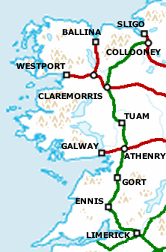
The Western Railway Corridor is a term, used since c. 2003, for a partly disused railway line running through the west of Ireland. Currently two sections of the line, from Limerick via Ennis to Athenry and from Collooney to Sligo, see regular services, with other sections either closed or only technically classed as open.
The RAC Foundation is a registered charity.

High-speed rail in the United Kingdom is provided on five upgraded railway lines running at top speeds of 125 mph (200 km/h) and one purpose-built high-speed line reaching 186 mph (300 km/h).

Old Oak Common (OOC) is a railway station under construction on the site of the Old Oak Common traction maintenance depot to the west of London in Old Oak Common, approximately 500 m (1,600 ft) south of Willesden Junction station. When built, it is expected to be one of the largest rail hubs in London, at about 800 m (2,600 ft) in length and 20 m (66 ft) below surface level.

High Speed 2 (HS2) is a high-speed railway which is under construction in England. The line will run between Handsacre, in southern Staffordshire, and London, with a spur to Birmingham. HS2 is to be Britain's second purpose-built high-speed railway after High Speed 1, which connects London to the Channel Tunnel. London and Birmingham will be served directly by new high speed track, and services to Glasgow, Liverpool and Manchester will use a mix of new high speed track and the existing West Coast Main Line. The majority of the project is planned to be completed by 2033.

Richard Howard Brown is a British transport executive. Until 30 June 2013 he was the chairman of Eurostar International Limited, having previously been Eurostar UK Ltd's chief executive between August 2002 and April 2010.

Sir Robin Christian Howard Niblett is a British specialist in international relations. He is a distinguished fellow at Chatham House and at the Asia Society Policy Institute, and a senior adviser at British strategic advisory firm Hakluyt & Company.

Northern Powerhouse Rail (NPR), sometimes referred to unofficially as High Speed 3, is a proposed major rail programme designed to substantially enhance the economic potential of the North of England. The phrase was adopted in 2014 for a project featuring new and significantly upgraded railway lines in the region. The aim is to transform rail services between the major towns and cities, requiring the region's single biggest transport investment since the Industrial Revolution. The original scheme would have seen a new high-speed rail line from Liverpool to Warrington continuing to join the HS2 tunnel which it would share into Manchester Piccadilly station. From there, the line would have continued to Leeds with a stop at Bradford. The line was intended to improve journey times and frequency between major Northern cities as well as creating more capacity for local service on lines that express services would have been moved out from.

The National Infrastructure Commission is the executive agency responsible for providing expert advice to the UK Government on infrastructure challenges facing the UK.

Transport for the North (TfN) is the first statutory sub-national transport body in the United Kingdom. It was formed in 2018 to make the case for strategic transport improvements across the North of England. Creating this body represented an unprecedented devolution of power from central government. TfN brings together the North's twenty local transport authorities and business leaders together with Network Rail, National Highways, and HS2 and works with the UK Government. The organisation has offices in Manchester and Leeds.

The history of High Speed 2 is the background to the planned construction of High Speed 2 (HS2), a new high-speed railway in Great Britain that was originally planned to connect London, Birmingham, Manchester, Leeds and other cities in the UK.
Sir Douglas Edwin Oakervee is a British civil engineer who is a past chairman of both High Speed 2 and Crossrail, and was the 139th president of the Institution of Civil Engineers. He was awarded the CBE in 2010 for his contributions to civil engineering and appointed Knight bachelor in 2022 for services to transport and infrastructure delivery.
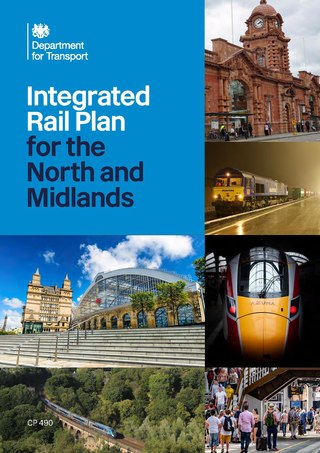
The Integrated Rail Plan for the North and Midlands or more simply, the Integrated Rail Plan (IRP), is a United Kingdom government proposal published on 18 November 2021. It aims to deliver "increased capacity, faster journeys or more frequent services on eight out of the top ten busiest rail corridors across the North and Midlands", by developing rail services along with the required infrastructure in these regions of England. It was published by the Department for Transport (DfT) and features forewords by Prime Minister Boris Johnson and Transport Secretary Grant Shapps, but its publication was delayed a number of times, partly because of the COVID-19 pandemic. It contains the significant proviso that "In line with the Government's existing approach to rail enhancements, commitments will be made only to progress individual schemes up to the next stage of development, subject to a review of their readiness." A Technical Annexe was published in January 2022. A correction slip was issued March 2022.